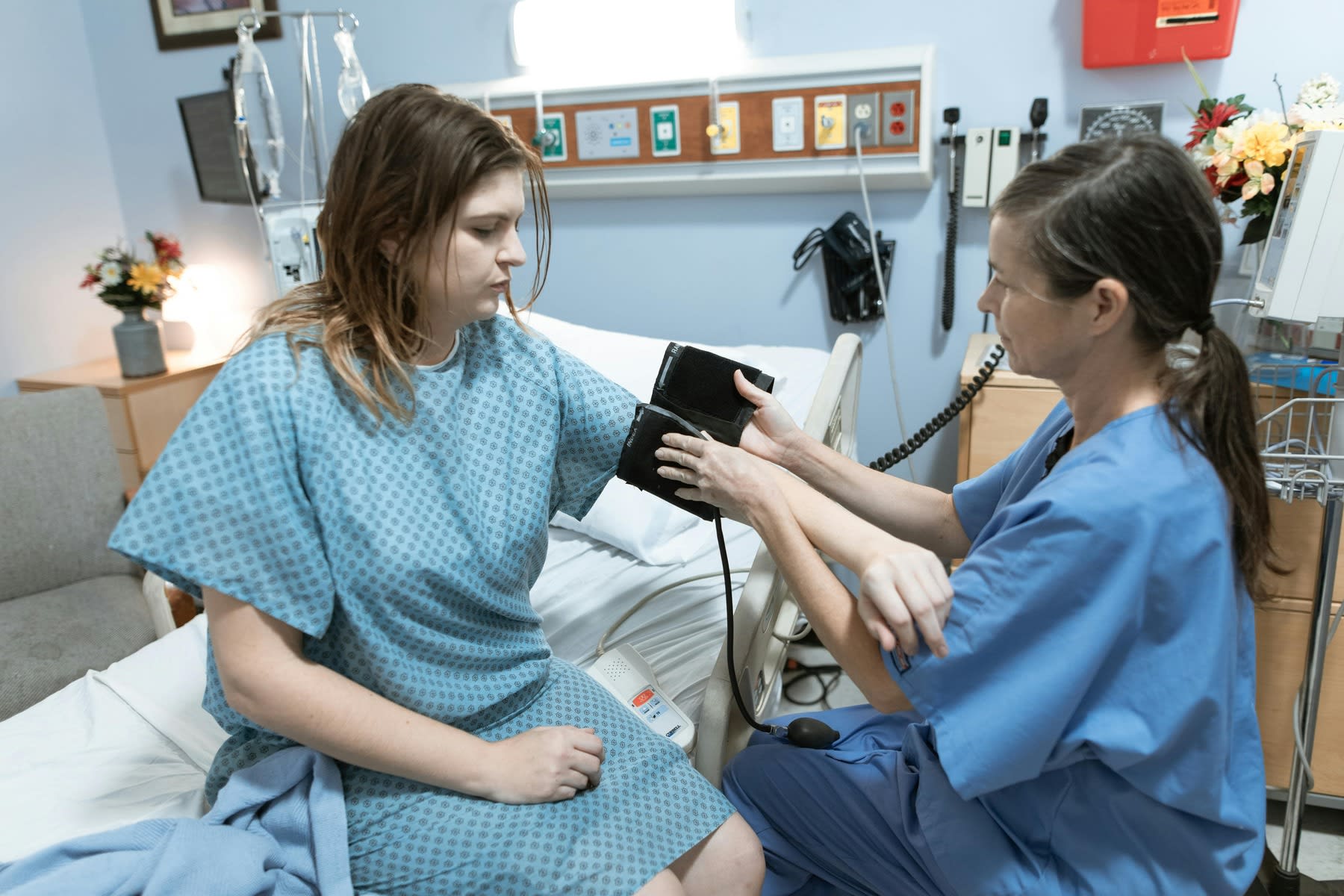What Can You Do with an ASN Degree?

Key Takeaways
- Graduates with an ASN degree can pursue medical care-related jobs, including staff nurse, medical assistant, or a research position.
- Nurses with an ASN degree can also work in non-medical care opportunities, such as medical writing, forensics, or patient coordination.
- An ASN degree can be a stepping stone to become a registered nurse (RN).
Nurses are in demand across various work settings. Not knowing what you can do with an ASN degree can limit your employment options and slow down your career progression. Our academic advisors provide insights into the educational advancement opportunities, areas of specialty, and career paths for ASN graduates.

Featured Programs
What Can You Do with an ASN Degree?
With an associate of science in nursing (ASN) degree, you can pursue a wide range of medical care-related jobs, including staff nurse, medical assistant, and research positions. There are also non-medical care opportunities, such as medical writing, forensics, and patient coordination. An ASN degree can also serve as a stepping stone to a bachelor’s degree and subsequent specializations.
Earning your ASN degree sets you on a path to becoming a registered nurse (RN). Here’s a compiled list of the various medical care-related job opportunities for an ASN degree holder.
| Position | Job Outlook (2018-2028) | Average Annual Income |
|---|---|---|
| Outpatient care nurse | 9% | $81,267 |
| Emergency room nurses | 6% | $78,267 |
| Travel nurse | 6% | $101,132 |
| Home health nurse | 8% | $101,717 |
| Clinical research nurse | 6% | $94,757 |
| Medical assistant | 14% | $40,745 |
| Infection preventionist | 10% | $76,500 |
| Community health nurse | 7% | $72,010 |
| Clinical case management officer | 12% | $58,955 |
| Patient coordinator | 13% | $38,703 |
| Insurance or healthcare representative | 5% | $48,409 |
| Medical writer | 7% | $82,739 |
| Forensic nurse | 6% | $72,659 |
Medical Care-Related Employment Opportunities for ASN Graduates
From hospital work to research, with an associate of science in nursing degree, nursing majors have various opportunities in the medical field. We’re listing the different professions where you can contribute to patient care and the healthcare community.
Outpatient Care Nurse
Outpatient care nurses provide medical care and support to patients in clinics, surgical centers, and physician’s offices. They monitor patient conditions, administer treatments, and educate patients on managing their health. With an ASN degree, you can:
- Perform patient assessments and develop care plans.
- Administer medications and treatments as prescribed.
- Provide patient education and support for self-care management.
Emergency Room Nurse
Emergency room nurses are at the forefront of providing critical care to patients with acute medical emergencies or traumatic injuries. Do you want to triage patients and help stabilize their conditions while collaborating with healthcare teams to deliver timely treatment? We recommend completing an ASN degree to learn how to:
- Assess and prioritize patient needs in high-stress situations.
- Administer emergency interventions and life-saving measures.
- Coordinate patient care and facilitate efficient patient flow.
Travel Nurse
Travel nurses have become solutions to the nurse staff retention crisis. They have the opportunity to work in various healthcare facilities and locations across the country or internationally. An ASN degree will train you to:
- Adapt to various healthcare settings and clinical environments.
- Develop cultural competency by working with diverse populations.
- Expand your professional network and experience different nursing practices.
Home Health Nurse
Home health nurses provide personalized care to patients in the comfort of their own homes. They monitor patients’ conditions, administer treatments, and coordinate care with other healthcare professionals. With an associate of science in nursing degree, you’ll acquire the skills to:
- Assess patients’ home environments and identify potential safety risks.
- Educate patients and caregivers on managing conditions and promoting independence.
- Collaborate with physicians and other healthcare providers to provide continuity of care.

Clinical Research Nurse
Clinical research nurses contribute to the advancement of medical knowledge and the development of new treatments. Whether you want to work in hospitals, non-profit organizations, or the best research universities for nursing degrees, this job entails coordinating clinical trials and maintaining compliance with research protocols. Use an ASN degree to learn how to:
- Assist in the recruitment and enrollment of study participants.
- Collect and analyze data for research studies.
- Maintain adherence to ethical and regulatory guidelines.
Medical Assistant
Do you want to assist with patient intake, monitoring vital signs, and performing minor medical procedures? Medical assistants support physicians and nurses in various healthcare settings, performing administrative and clinical tasks. An associate of science in nursing is one of the best programs to pursue as it will help you:
- Leverage nursing knowledge to provide high-quality patient care.
- Assist with procedures and treatments under the supervision of healthcare providers.
- Communicate effectively with patients and address their concerns.
Infection Preventionist
Infection preventionists are responsible for developing and implementing infection control policies and procedures within healthcare facilities. They monitor and investigate potential outbreaks and provide education to healthcare staff. As an ASN graduate, you can thrive in this career by knowing how to:
- Identify and mitigate infection risks.
- Develop and implement infection prevention protocols and guidelines.
- Conduct surveillance and data analysis to detect and respond to potential outbreaks.
Community Health Nurse
Program models for community health workers come in several forms, and these depend on the objectives of the health program and the situation in the communities that need medical assistance. Community health nurses promote health and well-being within specific communities. As a community health nurse with an ASN education, you will:
- Conduct community health assessments and identify health disparities.
- Develop and implement health promotion programs and initiatives.
- Provide education and support to individuals, families, and community groups.
Clinical Case Management Officer
Case management officers coordinate and oversee the care plans for patients, often those with complex medical needs or chronic conditions. They work to guarantee continuity of care and efficient use of healthcare resources. With an ASN degree, you can:
- Conduct patient assessments and develop individualized care plans.
- Collaborate with healthcare teams, including doctors, nurses, and social workers.
- Facilitate communication between patients, families, and healthcare providers.

Patient Coordinator
Do you want to try serving as the central point of contact for patients and their families? Medical knowledge is important in facilitating and streamlining the patient experience within healthcare facilities to promote efficient communication and care delivery. Your training and education from an ASN program will let you:
- Address patient concerns and questions.
- Coordinate appointments, procedures, and follow-up care.
- Advocate for patient rights throughout their healthcare journey.
Non-Medical Care Work Opportunities for ASN Degree Holders
With an associate degree in nursing, you can explore a variety of careers that extend beyond hospital or clinical settings. These roles often involve interacting with patients in unique ways and can offer more regular hours.
Insurance or Healthcare Representative
The highest percentage of non-wage compensation, about 26%, comes from health insurance. Insurance or healthcare representatives serve as liaisons between healthcare providers, patients, and insurance companies. You can use your ASN degree to:
- Interpret and explain healthcare policies and procedures.
- Act as a patient advocate, making sure their rights and needs are addressed.
- Provide guidance on insurance coverage and billing inquiries.
Medical Writer
Medical writers create and develop content related to healthcare, such as patient education materials, research papers, and marketing collateral. They maintain accurate and accessible communication of medical information. As an ASN graduate, you can:
- Apply your clinical knowledge to write about medical topics with authority.
- Translate complex medical data and research into clear, understandable language.
- Collaborate with healthcare professionals to guarantee content accuracy and relevance.
Forensic Nurse
The rising demand for forensic nurses stems from the need to combine legal and investigative contexts, often working with victims of violence, abuse, or traumatic incidents. An associate degree in nursing will help you succeed as a forensic nurse who needs to:
- Assess and treat victims of crime or trauma.
- Accurately document and preserve evidence for legal proceedings.
- Serve as a liaison between healthcare and legal systems.
Educational Advancement Opportunities Following an ASN Degree
With an associate of science in nursing degree, you have a solid foundation to seek further education in nursing. These next steps can help you meet your career goals and expand your skill set in the healthcare field.
Transition to BSN
When you’re aiming to advance your nursing education, transitioning from an ASN to a Bachelor of Science in Nursing (BSN) degree is a strategic move. Many universities and traditional colleges offer RN to BSN programs specifically designed for this purpose.
An RN to BSN program typically takes two years or less if you’ve already earned an ASN. Many programs offer online courses, allowing you to balance work and study.
Transition to an Accelerated MSN
There are also universities that allow ASN graduates to transition directly into an accelerated online master of science in nursing (MSN) program, bypassing the traditional BSN requirement. This pathway saves time and potentially reduces educational costs while letting you fast-track your career progression.
These accelerated programs typically recognize the clinical experience and foundational knowledge gained through an ASN degree. In effect, you can build upon your existing skills and complete your master’s degree in a shorter timeframe.
Back to TopAreas of Specialization of ASN Graduates in Healthcare Settings
Similar to specializations for BSN students, ASN degree holders can specialize in various areas. We recommend specializing to help you gain specific skills tailored to each patient’s care needs.
Pediatrics
Pediatric nurses specialize in caring for children from infancy through adolescence, providing medical care and support for various childhood illnesses and conditions. Training from an ASN program will let you:
- Perform age-appropriate assessments and administer treatments.
- Educate families on child health, safety, and developmental milestones.
- Provide emotional support to children and families during medical procedures.

Oncology
Oncology nurses care for patients with cancer, supporting them through diagnosis, treatment, and recovery. With an ASN degree, you can:
- Assist in the administration of cancer treatments and monitor patient responses.
- Educate patients and families about cancer care and symptom management.
- Collaborate with multidisciplinary teams to develop comprehensive care plans.
Mental Health
Do you want to collaborate with other mental health professionals to work with patients experiencing various psychiatric disorders? Consider taking up an associate degree in nursing to learn how to:
- Conduct mental health assessments and monitor patients’ progress.
- Prescribe psychiatric medications and observe for side effects.
- Facilitate individual and group therapy sessions under supervision.
Rehabilitation
Rehabilitation nurses assist patients recovering from injuries, illnesses, or surgeries to regain independence and improve their quality of life. With an ASN degree, you can:
- Assess patients’ functional abilities and develop individualized care plans.
- Assist with physical therapy exercises and mobility training.
- Educate patients and families on home care and adaptive techniques.
Emergency Room
Do you thrive in fast-paced workplace settings? Emergency rooms provide rapid assessment and care for patients. The knowledge and skills you will gain from an ASN will help you:
- Quickly assess and prioritize patient needs in critical situations.
- Assist with emergency procedures and life-saving interventions.
- Coordinate patient care and communicate effectively with interdisciplinary teams.
Long-Term Care
In America, about 15% of adults over 80 years old receive long-term care at home. Long-term care provides ongoing care for patients with chronic illnesses or disabilities in settings such as nursing homes or assisted living facilities. Your ASN education will help you support patients’ daily lives as you:
- Develop and implement long-term care plans for residents.
- Administer medications and treatments for chronic conditions.
- Provide emotional support and promote quality of life for long-term residents.
Nursing Management and Administration
Nurse managers and administrators oversee nursing staff and maintain the efficient operation of healthcare units or departments. Some institutions accept an ASN degree as long as you are an RN and have the required years of experience or certifications. When aiming to become a nurse administrator, your ASN education can teach you how to:
- Supervise nursing staff and coordinate patient care activities.
- Implement policies and procedures to promote quality care and regulatory compliance.
- Collaborate with interdisciplinary teams to improve patient outcomes and operational efficiency.
Potential Work Settings for ASN Degree Holders
After completing an ASN program, you can look for jobs in different healthcare settings. We encourage you to start looking at the common industries that employ ASN graduates and consider applying to institutions located in the highest-paying states for nursing jobs:
- Public or private hospital departments
- Specialty clinics
- Offices of doctors and health practitioners
- Outpatient care services
- Nursing care and assisted living facilities
- Home healthcare services
- Insurance companies
- Office clinics
- Schools, colleges, and universities
Related Questions
How Does an ASN Work?
An associate of science in nursing is typically a two-year program that combines classroom instruction with hands-on clinical experience. Students learn fundamental nursing skills, medical terminology, anatomy, physiology, and patient care techniques. Upon completion, graduates are eligible to take the NCLEX-RN exam to become licensed registered nurses.
What Are the Necessary Licensures and Certifications for an ASN Graduate?
The primary licensure required for ASN graduates is the Registered Nurse (RN) license, obtained by passing the NCLEX-RN exam. Additional certifications may be required or beneficial depending on the specific nursing role or specialization, such as Basic Life Support (BLS), Advanced Cardiac Life Support (ACLS), and Pediatric Advanced Life Support (PALS) certifications.
How Can I Choose the Best ASN Program?
If you want to choose the best ASN program, prioritize accredited programs with high NCLEX-RN pass rates, clinical placement opportunities, advanced coursework, and good faculty qualifications. Determine whether your finances and schedule suit on-campus, online, or hybrid ASN programs.
Conclusion
An ASN degree prepares you to make a tangible difference in patients’ lives. Whether working in acute care settings, long-term care facilities, community health organizations, or pursuing specialized nursing roles, a thorough understanding of employment opportunities with an ASN degree lets you choose the right career that aligns with your passion and goals.